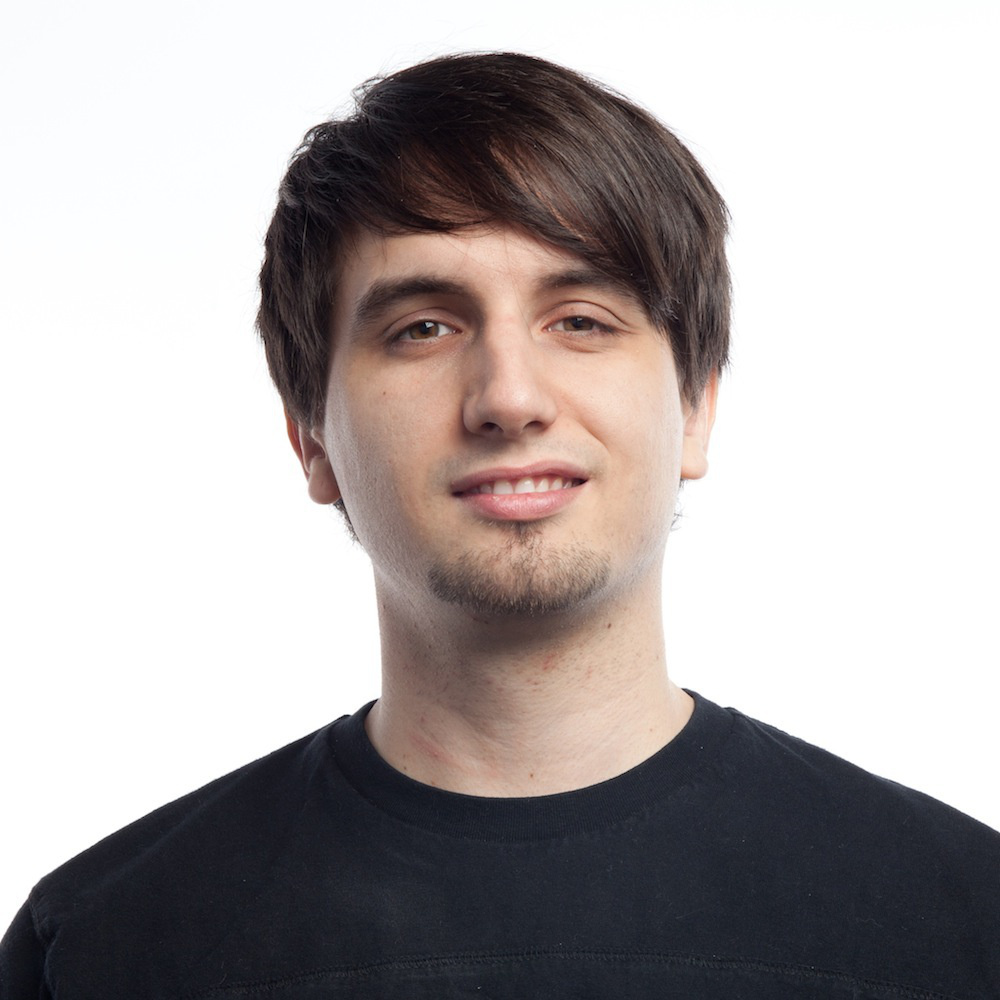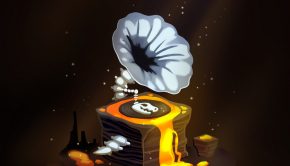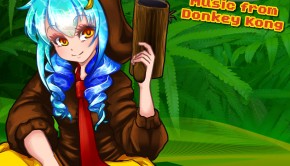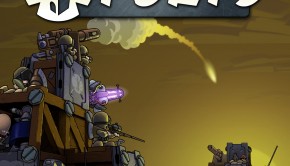Robby Duguay Interview: Breaking into Game Audio
Robby Duguay is a Toronto-based composer specialising in scoring games and films. In a short time, he has already made several remarkable projects: creating a glitchy accompaniment to We Are Doomed, contrasting serenity and chaos on Fate Tectonics, and even releasing two volumes of chiptune arrangements of Christmas carols.
In this interview, Robby Duguay gives a valuable insight into how he broke into the industry. Along the way, he discusses his background, scores, and albums. It’s a great way to introduce yourself to an artist who no doubt we’ll be hearing much more from.
Interview Credits
Interview Subject: Robby Duguay
Interviewer: Chris Greening
Editor: Chris Greening
Coordination: Chris Greening
Interview Content
Chris: Many thanks for talking to us today, Robby Duguay. First of all, can you tell us about your musical background? Is it safe to assume you’re a fan of games?
Robby Duguay: There were definitely a lot of factors that have lead me here. For one, my parents were always very supportive, even though neither of them are musicians. I got my first guitar at age 2 and did well in music classes in school.
I eventually went to an arts school, where I had 3 hours of music classes a day all year. My performance instruments there were Trumpet and French Horn. I performed in classical groups, jazz, metal, solo acoustic, choirs, musicals — anything I could get into. Being in bands is really tough because there are always varying levels of musicianship and commitment, as well as time constraints, so I often found myself alone at the computer/piano/guitar working on tunes.
My first console was a SNES, and my first JRPG was Final Fantasy Mystic Quest. The music had a huge impact on me, which lead me to the main Final Fantasy series and discovering the music of Nobuo Uematsu. That was the first time I realized that someone somewhere had the job of making music for games. Of course, I was already making music, so why couldn’t it be for games too?
Chris: From there, how did you land your first gig?
Robby Duguay: After high school, I started composing for short films and student projects, and I landed my first gig writing a theme for a TV show. I totally bombed it. I had no idea what I was doing, I was wrong for the job, and I got very negative feedback. Nothing about it was right, and I ended up not really composing for media again for 5+ years. I know now that was just another part of being a composer, but it hit me pretty hard and I had a lot of other things going on in my life at the time.
In 2011 my wife pointed out that I was increasingly unhappy with my job, and we decided to do something about it. It was time to just go for it and make music for games. I had still been playing and making music all along, so I began working on a new portfolio, became a member at Bento Miso and started to make contacts in the games industry.
Chris: You have a background as an audio-visual tech expert. Could you give the lowdown on this? What work have you done with bands, theatre, and whatnot?
Robby Duguay: When I played in bands, it seemed that I was the only one who cared to learn anything about how the sound gear worked. Between that and helping out with AV at school and church, I had a solid tech foundation by the time I graduated high school. A few months after I moved to Toronto, I got a job at an AV company where I worked my way up from being a driver to running small shows on my own.
After that I opened my own AV business which catered mostly to pharma and medical clients. I often recorded, streamed, and ran powerpoint and live sound at the same time during an event. There can be a lot of a high expectations in AV. The hours are tough too, because you’re the first one there, the last to leave, and there’s a surprisingly large amount of travel. Part of transitioning to game audio was because I wanted to be home more.
I have a few friends who work in theatre, and I’ve helped them out from time to time. Some of the productions have 30-40 wireless mics, full live band, pyro, rigging, etc — they are a ton of fun to put on! Performing in a musical is one thing, but making a guitar fire sparks out over the audience’s heads is cool on a totally different level.
Chris: Since then, you have broken into games through indie projects such as The Great Martian War, Big Zoo Fun, and Elegy. Can you tell us about how you learned to compose and design sounds for smartphones? How have you established and cultivated links with developers?
Robby Duguay: Big Zoo Fun was my first paying gig in games! The creator, Thadeus, was looking for some sound effects and someone to make sure they were balanced. I convinced him over time to let me throw in some music too. This project was a reality check because I finally understood that I was working on someone else’s creation: there were many, many rounds of revisions. They were worth it, and I think it turned out great! I realized I’d come a long way from my earlier rejection.
Making sounds for phones should actually be approached in the same way as anything else. You want to make sure it sounds good, period. Part of the due diligence is to test it through the device speakers, but the end user might have a bluetooth speaker or headphones. You can’t forget to check your mixes in mono, too!
A big part of finding work has been due to my involvement within the community. I work out of Bento Miso, a co-working space, where I’m around game developers every day. They’re the friends I go to lunch with or hang out with at events. When they have audio work that needs to be done, they often come to me because we already work so closely to each other. We know that we get along.
Chris: You describe yourself as someone who “writes in a wide range of styles, from orchestral pieces to chiptunes, guitar ballads and electronic music.” Can you elaborate on how you’ve developed such versatility over the years?
Robby Duguay: I’d say that stems from how many different styles I’ve played around in, which I touched on a bit earlier. I really love playing different instruments and listening to a wide range of genres. If you listen closely and try to isolate the elements that are present in any given style of music, it’s not long before you start to see patterns and similarities of instrumentation, rhythm, or structure.
I am comfortable in an orchestral setting from studying Trumpet and French Horn in an ensemble. By contrast, I love chiptunes because it strips everything down to bare elements with a limited palette. All that being said, I think guitar will always be my “main” instrument.
Chris: Your music also has high production values. Can you tell us how you have achieved this? What hardware, software, and performers help bring your music to life?
Robby Duguay: Thanks! This is something I try very hard to improve all the time. On a day to day basis, I do my work in Logic 9. I have a huge problem where I constantly feel a compulsion to buy more hardware (maybe you can relate), so I won’t get into a “gear list” this time. I will say I use an Apollo Quad as my interface, Audiotechnica M50 headphones and Dynaudio BM6A monitors.
I’ve spent a long time making music in the digital world, so I think that regardless of DAW it’s about the core concepts of how sound is processed. Fifteen years ago I was using something called Music Maker, then switched to Cubasis (an early Cubase Lite). When I track in a studio, it’s often in Pro Tools, and I perform using Ableton Live. Reaper is cool too.
Because I’ve been around so many musicians for so long, it’s not hard to find someone to record with a specific instrument if the project calls for it. My cousin Cameron tracks drums for me (he’s all over the Snow soundtrack), I recorded my wife’s voice for We Are Doomed, and my friend Jordan does violins for me on occasion. More often than not, my projects don’t call for much live element, but I throw it in where I can.
To anyone looking for advice on how to make their mixes better: learn more about compression and limiting, even if you think you’ve got it down. There is always more to learn and a little improvement in dynamic range goes a long way.
Chris: Your breakout soundtrack, We Are Doomed!, took a fascinating approach. How did you develop the tracks so they gradually shifted from ambient to intense? How was this integrated in the context of the game?
Robby Duguay: The shift from ambient to intense was definitely the goal from the outset. When the developer Mo first explained the game to me, he described a level that was calm and beautiful, but slowly took on more and more enemies and glitching, and we knew the music had to reinforce that as well. We went back and forth on what musical elements needed to be present for a long time, eventually developing a musical style guide.
Both game modes involve waves of baddies, so once you pass a certain number of waves, the song transitions to the next, slightly faster, slightly glitchier track. I originally pushed for a more dynamic approach but there’s only so much one can do as a single programmer on a multi-platform game with a deadline.
Chris: You contrasted ‘serenity’ with ‘chaos’ in a distinct way for Fate Tectonics. Can you tell us how you created two arrangements of each piece for this game? How does this contrast enhance the in-game experience?
Robby Duguay: It was a lot of hard work coming up with the soundtrack for Fate Tectonics, because the music in the game is triggered dynamically. Each fate has their own instrument voice that gets added to the mix when you add that fate to your world. The accompaniment changes depending on how well you’re playing, and which tile types you choose – that kind of thing, for up to 16 voices at any given time. There are 3 acts, each with 5 sections that are arranged into a few forms (ABACADEE, etc). With all those variables changing, the music is slightly different every time you play.
Since the transitions follow the gameplay, I had to make up a story of what was happening in one play session for the soundtrack. Once I had a structure in place, I realized that I wanted to show the “chaos” of Ragnarosa and Fortuna, but transitioning to and from their voices (raver beats) in the middle of a soundtrack album didn’t feel right. I realized that I could mirror the two game modes by having an A side and a B side to the soundtrack.
When I listen to music it’s usually grouped by genre, so I thought it would be more enjoyable to give the listener 22 minutes of a complete idea performed two different ways. Writing music for a whole game using SNES-style voices was a ton of fun, and I hope to do it again soon.
Chris: You’ve also had experience as a film composer, releasing your soundtrack for Snow on Bandcamp. Can you tell us about this Toronto-developed film and your soundtrack for it?
Robby Duguay: The film was adapted from a graphic novel by Benjamin Rivers, who is a game developer from Toronto. I knew him from hanging out at different industry events, and had met the director, Ryan Couldrey, in passing that way as well. After reading the book, I had a pretty clear idea in my head for the direction the soundtrack should take, so I pitched it to Ryan and he liked it.
Most of the soundtrack is just simple electric guitar lines with subtle pads, lots of sixths and held notes, mostly mood stuff. I used the electric guitar because I feel it captures the rawness of Queen Street where the film takes place. For the longest time, the drums were midi-tracked and it didn’t feel right. I recorded live drums with Cameron within the last few days before it was due and it really made all the difference, especially to the last scene of the film (the track is called “Close”).
Chris: To finish up, let’s talk about 12GB of Christmas. What inspired these game music Christmas tributes and how did you assemble it? Is a third volume coming in 2015?
Robby Duguay: I LOVE CHRISTMAS. It’s my favourite time of year, and I don’t let anyone forget it. I’ve already started singing carols. There are so many traditional carols that are being lost and replaced with “Baby Please Come Home” on the radio, so I wanted to try and bring new life to some amazing music. These thoughts had been floating around in my head for a long time, but the actual decision to make the first album was very spur-of-the-moment.
Bento Miso puts on a games/comics/zine vendor fair called Bit Bazaar, which usually happens twice a year. Local creators sell their usual work, plus some special physical merch ranging from buttons to prints, t-shirts, boxed copies or figurines, whatever you can think of. Two weeks before the winter market in 2013, I decided to throw my hat into the ring and 12GB of Christmas was born. I made the whole first album in those two weeks.
There WILL be a 12GB of Christmas volume 3, if humanly possible. I already have the songs picked out, it’s just a matter of managing my workload before December. I’m really starting to run out of public domain carols that aren’t super obscure, so I may have to begin depending on the wonderful licensing team at Loudr for volume 4.
Chris: You’re still a relative newcomer to the game music industry. What’s coming up next for you? What are your ambitions in the long-term?
Robby Duguay: Lately I’ve been putting all my time into supporting the Fate Tectonics release and we’ve been discussing plans for the next Golden Gear project. I’ve made some plans with Mo/Vertex Pop too, so it’s safe to say I’ll be working on his next game also.
At this point it’s still really early, and aside from my next Christmas album, there is nothing that I can really announce “officially.” I have a long way to go to develop my own audience, so for now I’m just happy to keep the train rolling.
In the long term, I’d like to do a lot more orchestral work and SNES or PS1 sounding music, and I’m especially looking for the chance to work on an RPG. I’d like to work on a longer story game, where I can explore and develop themes and voices in a deeper way. I haven’t found an excuse to write a metal soundtrack yet either, so maybe someday…
One project idea that keeps coming back around is “Fate Symphonics”, a live, orchestral performance. If anyone has a spare orchestra kicking around, drop me a line!
Chris: Many thanks for your time today, Robby. Is there anything else you’d like to say about yourself or your works? Do you have any messages for your fans around the world?
Robby Duguay: I really appreciate the positive feedback people have sent me. It honestly means the world to me to be able to create things for others to enjoy. Follow me on my site , Bandcamp, Soundcloud, and Twitter. Thanks for having me, Chris.
Posted on September 13, 2015 by Chris Greening. Last modified on September 13, 2015.















